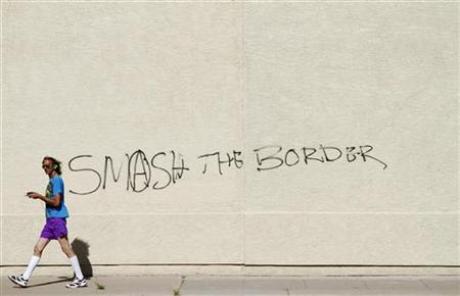The White House is expected to file a lawsuit next week. Arizona has raised more than $120,000 in private donations to defend the legislation.Reporting from Washington A White House showdown with the state of Arizona over its tough new immigration law is likely to unfold next week, when the Obama administration is expected to file a lawsuit aimed at blocking the state’s bid to curb illegal immigration on its own, according to people familiar with the administration’s plans.
Arizona officials are girding for the legal challenge. The state has raised $123,000 in private donations to defend the law, according to Gov. Jan Brewer’s office. Money has come in from all 50 states, in donations as little as $1.Obama administration officials declined to reveal the basis for the suit. But legal experts say the challenge is likely to include the argument that in passing the law, Arizona violated the Constitution by intruding on the federal government’s authority to regulate immigration.To date, the state has been hit with five lawsuits. The law, SB 1070, was signed in April and is scheduled to go into effect July 29.
By confronting Arizona, the Obama administration would be making a political statement as much as a legal one. Obama has already criticized the Arizona law as “misdirected.” Criminal action against illegal immigrants is not, by itself, a satisfactory solution to the nation’s dysfunctional immigration system, the White House says.Obama has said that part of the remedy must include a path to legal status for the estimated 11 million people living in the U.S. illegally. But with mid-term elections approaching, the president has not made the politically explosive issue a legislative priority for 2010.
Brewer and other Republican officials have recoiled at the prospect of a federal suit.”Perhaps the administration should focus on getting the assets they promised to the border region rather than wasting time and taxpayer dollars on suing the state of Arizona,” said Brooke Buchanan, a spokeswoman for Sen. John McCain (R-Ariz.).
The Obama administration tipped its hand on its plans earlier this month when Secretary of State Hillary Rodham Clinton said in an Ecuadoran television interview that a lawsuit was coming. Outraged, Brewer said the administration should “inform us before it informs the citizens of another nation.”
The Arizona law empowers police, after making a lawful stop, to verify the immigration status of people they reasonably suspect are in the country illegally.
Opponents warn that the law could be easily abused — enforced in a fashion that unfairly targets Latinos.Lucas Guttentag, director of the ACLU Immigrants’ Rights Project and an attorney who is part of a group of civil rights organizations contesting the law, said: “A legal challenge by the Justice Department would help ensure that Arizona’s renegade state law, which will cause racial profiling and undermine effective law enforcement, does not actually go into effect.”


